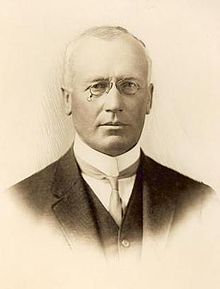Sir William Irvine
|
The Honourable Sir William Irvine GCMG |
|
|---|---|
 |
|
| 21st Premier of Victoria | |
|
In office 10 June 1902 – 16 February 1904 |
|
| Preceded by | Alexander Peacock |
| Succeeded by | Thomas Bent |
| Constituency | Lowan |
| 9th Attorney-General of Australia | |
|
In office 24 June 1913 – 17 September 1914 |
|
| Preceded by | Billy Hughes |
| Succeeded by | Billy Hughes |
| Constituency | Flinders |
| Personal details | |
| Born |
6 July 1858 Newry, County Down, Ireland |
| Died | 20 August 1943 (aged 85) Toorak, Melbourne, Australia |
| Political party | Commonwealth Liberal Party |
| Spouse(s) | Agnes Somerville |
Sir William Hill Irvine, GCMG (6 July 1858 – 20 August 1943), Irish born-Australian politician and judge, was the 21st Premier of Victoria. Irvine was born in Newry in County Down, Ireland, into a Scottish-Presbyterian family; he was the nephew of Irish revolutionary John Mitchel. He was educated at the Royal School, Armagh and Trinity College, Dublin, graduating in law in 1879 before migrating to Melbourne, where he taught in Presbyterian schools and read law at Melbourne University, gaining a master's degree in arts and law. He soon became a leading Melbourne barrister.
In 1894, Irvine was elected to the Victorian Legislative Assembly as a liberal. He was Attorney-General 1899–1900 and 1902–03 and Solicitor-General in 1903. He succeeded George Turner as leader of the Victorian Liberals, but was much more conservative than either Turner or the federal Protectionist Party leader, Alfred Deakin. In 1902 he displaced the more liberal Alexander Peacock and became Premier and Treasurer, holding office until 1904, when he was succeeded by Thomas Bent.
In 1906, Irvine was elected to the Australian House of Representatives for the seat of Flinders. First elected as an independent Protectionist, he became a member of Deakin's Commonwealth Liberal Party in 1908. He was Attorney-General in Joseph Cook's Liberal government of 1913–14. He was considered a potential Prime Minister of Australia, but his abrupt manner and hard-line conservatism made him unacceptable to many Liberals: he was known in Parliament as "Iceberg Irvine."
...
Wikipedia
